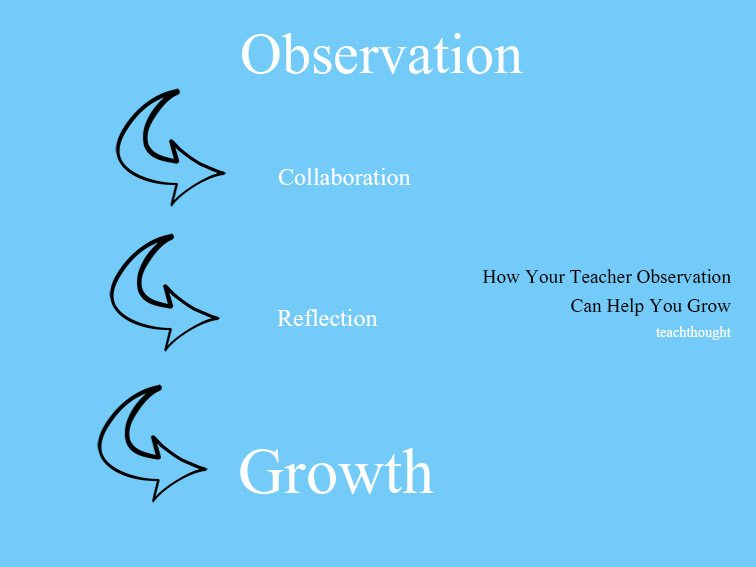 How Your Teacher Observation Can Help You Grow
How Your Teacher Observation Can Help You Grow
by Paul Moss
For many, teacher observations are their biggest source of dread.
They stir feelings of nausea, spark vigorous and often angry debate about their efficacy, and are to be avoided at all costs.
But with the trend of performance pay sliding into the education environment like a rattlesnake, the fear of observations has some very real and legitimate origins. No one wants to lose his or her job, or his or her pay rise. In such a context, mastering the process of observation has become increasingly important for a teacher, and one of the keys to success, alongside planning excellent lessons, is approaching observation with a positive mindset.
Here is some thinking (that can hopefully help) to turn observations into desirable opportunities for personal growth.
Why Shouldn’t Fear Your Teacher Observation
1. You’ll have plenty of opportunity to show your strengths.
Observations are in plentiful supply. Before the dreaded ‘real thing’, you can have SO many chances to practice being observed. Being observed by faculty leaders, colleagues, and yourself (if you utilize technology) will go a long way to helping you to shape a picture of what your teaching is like, and where it needs to go in the future, and place you in good stead before the observation that counts.
If you wait until the ‘real’ observation to receive feedback, you forego opportunities to iterate in your teaching, and significantly increase the chances of failure.
2. If you want to improve, you need feedback.
I’ve never met a teacher who didn’t want to get better. To do so, you can either teach in isolation, and refine your craft after personal reflection, and eventually get better, or you can get to that same position in about a tenth of the time by having someone else in on the process. Sometimes it’s the little things that another set of eyes will see that can rapidly improve your teaching.

3. It will humble you–and humility is fuel for a growth mindset
Observations can be a humbling and grounding process. Few teachers would claim they have mastered the art of teaching, yet all progressive teachers would agree that learning from the feedback of others is essential. It is a strange paradox, but teaching is perhaps more about learning than anything else.
As a modern teacher, you can’t teach unless you are learning from the environment around you, adapting to the students’ needs. Seeking advice from others and knowing that others have lots to offer is humbling, and keeps your feet firmly on the ground. So, my friends, swallow your pride, and become the learner more often! The advent of worldwide personal learning networks truly reinforces this sentiment.
4. It means what you do is important.
If people are watching you, what you’re doing matters.
Observations can be an amazing professional development opportunity–you’re lucky you’ve got the support to improve, and are actively encouraged to receive the help of mentors and leaders in the field! The potential to improve quickly from such support is massive. Once an investment has been made in you, a school will work hard to ensure that you are getting better; a rare opportunity in the workplace.
5. It’s a part of our professional growth.
Observations are common to every one in your faculty, so use your immediate support network. Every teacher in your faculty is going through the same thing, so work together, and discuss what you are going to do before the observation takes place – get advice, feedback etc.
No one is going to judge you, because they are going through it too.
6.They’re only going to get easier.
Observations (should) become easier the more of them you do. The more times you get observed, the more used to it you get, and the more a part of your routine it will become. Don’t wait for formal observations. Pester your supervisor to watch you more; and your colleagues. And now you don’t even need to be limited by their time: utilize technology to look back on your lessons, and share them with anyone around your school, or the world, who similarly wants to improve their practice. Iris Connect looks like a great starting point for that.
7. They’re an opportunity.
Observations are a chance to demonstrate your skills, ideas, affection, and growth. Showing others what you can do is about taking ownership of your ability, and being proud of your growth and insights into what you do. Of course, there will be hitches on the path to success, but in the end, we all like to show others that we have a connection with what we do. You wouldn’t have been hired without it, and you wouldn’t have made numerous connections with students without it either.
Isolation Doesn’t Lead To Growth
Teaching in isolation may seem like an easier option compared to being observed, but it is not an effective way to get better. The key to embracing observations is all in the approach. Seeing observations as allies rather than enemies is the first step in such a process.
In part 2, we’ll talk about what schools and leadership teams can be doing to maximize the potential of observations.
How Your Teacher Observation Can Help You Grow; adapted image attribution flickr user leaflanguages
